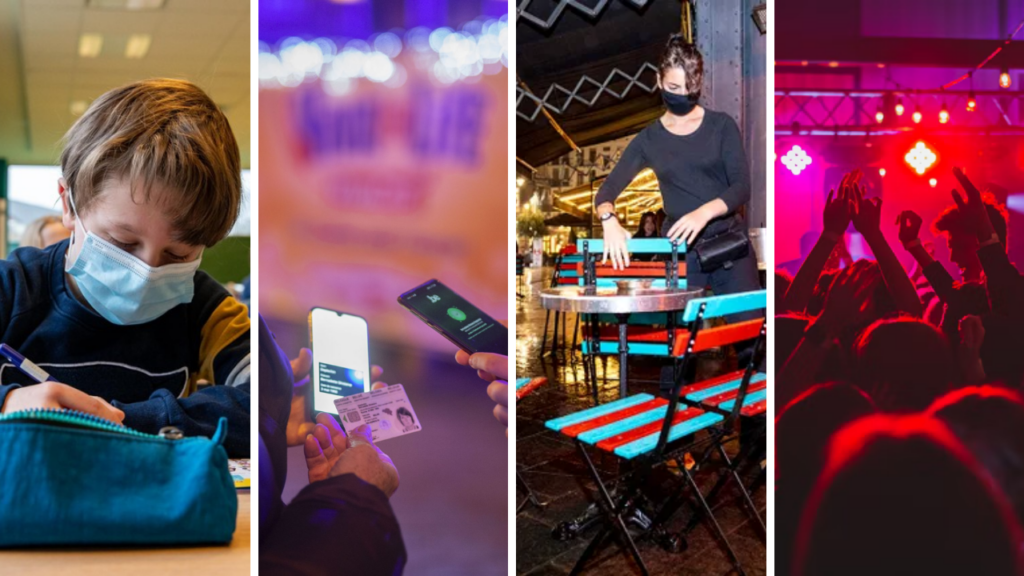A series of measures are being relaxed from today, as the Consultative Committee decided to move Belgium into 'code orange' on the country's coronavirus barometer.
From the reopening of the nightlife sector and lifting of closing hours to face masks and travel, here is an overview of the latest changes.
The new rules entered into force at midnight and will apply until 27 April, but the epidemiological conditions will be closely monitored and evaluated at the next Consultative Committee, according to the Royal Decree published by Interior Affairs Minister Annelies Verlinden.
Teleworking
The obligation to telework four days a week is abolished. However, it is still recommended that all people employed by enterprises, associations and services work from home, unless the nature of the job or the continuity of the business, activities or services makes it impossible.
Team-buildings which requires people's physical presence and non-public company events at the workplace are no longer banned either.
Hospitality sector and nightlife
The closing time for bars, restaurants and other hospitality establishments is lifted, as is the maximum number of people allowed per table. Clients can also consume their food or drink while standing up again. Only staff members still have to wear a face mask.
If the indoor air quality limit of 1500 ppm cannot be met, a distance of 1.5 metres between tables must be provided or other measures taken so that the limit can be met.
Related News
When there is a lot of movement (such as dancing), and the indoor air quality target of 900 ppm CO2 cannot be met, the number of customers received inside should be limited to 70% of the maximum capacity. This does not apply to catering activities at weddings and funerals.
Nightclubs and dance halls can reopen, following the regulations for the Covid Safe Ticket (CST). Additionally, the use of an air quality meter (CO2) is mandatory in all indoor areas accessible to the public.
Youth, sports and leisure activities
For organised outdoor activities, the restriction on the maximum number of participants is lifted. Indoor activities are allowed for one or more groups of up to 200 people per group.
Shopping no longer has to be done alone or in pairs, and the restrictions on the maximum number of clients allowed in shops at the same are also lifted. Access control in large shops or shopping centres is no longer required either.
Markets, including fairs, street markets, flea markets and funfairs, may now also be visited by groups of more than two people.
Events
Indoor dynamic events are allowed again. If more than 200 people attend, 70% of a venue’s capacity can be used. For all other events with more than 200 attendees, 80% of a venue’s maximum capacity is allowed to be used.
A valid CST is required for indoor events from 50 attendees, and for outdoor events from 100 attendees.
However, these restrictions can be lifted for indoor events if the air quality can be guaranteed. The same is true for outdoor events, in case of sufficient compartmentalisation or anti-crowding measures.
Face masks must only be worn at non-dynamic indoor events, except at home or in a tourist accommodation. At all other events, only staff members are required to wear a mask.
Face masks
Wearing a face mask where it is required is mandatory for everyone from 12 years old. This is the only measure that takes effect on Saturday 19 February, instead of on Friday.
Travel
Non-Belgian residents from 12 years old must always be able to present a valid and recognised vaccination, test or recovery certificate when coming to Belgium, regardless of the colour code of the country they come from.
Travellers coming from non-EU/Schengen countries who are not on the white list must still be either fully vaccinated, or be travelling for essential reasons. This does not change, but they no longer need to submit an additional test certificate if they have a valid and recognised vaccination or recovery certificate.
The exceptions for travel of fewer than 48 hours without a carrier and for specific categories of travellers (such as cross-border workers) continue to apply.
Additionally, the standard validity period of the different certificates for travel will be maintained as they were determined at EU level.
In practice, this means that the vaccination certificate is valid for 270 days (nine months) in the case of a basic vaccination and unlimited after a booster dose. The recovery certificate is valid for 180 days (six months) after a positive PCR test. A test certificate with a negative PCR test result is still accepted for 72 hours, but with a Rapid Antigen Test (RAT) only for 24 hours (instead of 36 previously).

